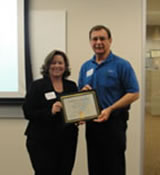
Business Councils


Spanning over 85 square miles, Riverside is a large and diverse city. Because of the size of our greater Riverside community, the Chamber realized we can better serve our community by having six Area Business Councils. Allowing members to work on issues within their own geographic area of the city. Contact: Liam Walgenbach, lwalgenbach@riverside-chamber.com
Below are answers to the most frequently asked questions about the Greater Riverside Chambers of Commerce Business Council program. What is a Business Council?A Business Council is a volunteer organization, comprised of Chamber members and located in a specific geographical area, which provides a channel for its members to be involved in solving problems, discussing issues, and implementing special projects and events for the benefit of the area being served. What is the benefit for a Chamber member to participate in a Business Council? Participation can maximize the existing benefits derived from Chamber membership. It offers members the opportunity to prioritize and bring a focus to the business needs of the area, and to take community leadership roles in addressing these needs. It can increase members' business network within the geographical area, and provide stronger representation on area issues. Also, since area councils exist in smaller geographical areas, participation provides an opportunity for area-specific networking with others doing business in the same part of town. There is no additional charge to participate in an Area Business Council. This benefit is included in your Chamber membership. What is a council's relationship to the Greater Riverside Chambers of Commerce? Each council operates with a board of directors whose chair serves on the Chamber's Greater Board of Directors, the policy decision-making body of the Chamber. These representatives keep the Board aware of the councils' action and progress. The Chamber provides a staff liaison to assist the councils with the development of special events and programs, production and mailing of council correspondence and coordination of all board and committee meetings. The councils, through their liaison, can draw on Chamber resources, such as the communications staff, for the production of needed printed materials or the development of press releases. The council liaison works closely with the councils in the development of their operating guidelines, plans of action and annual budgets. The councils are fiscally responsible to the Chamber. |
|
|||||||||||||||||



